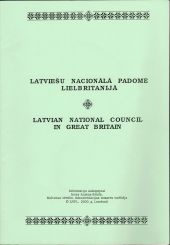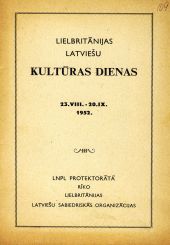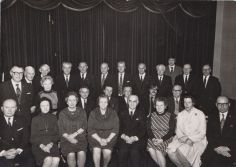After World War Two there were tens of thousands of Latvian refugees, over 14,000 of whom came to Britain. The Society of Latvians in Great Britain had already been founded in 1942, and the Latvian Welfare Fund founded by Latvian ex-servicemen came into being in 1947 to provide moral and practical support to their compatriots.
The Latvian envoy, Kārlis Zariņš, recognising how the political situation was developing, and proposed creating an umbrella body that would be able to represent Latvian refugees in situations, where the Latvian Legation was not authorised to do so. Thus, on 27 November 1947, a committee was charged with setting up temporary statutes and organising elections for the Latvian National Council in Great Britain (LNC GB) (Latviešu Nacionalā Padome Lielbritānijā, LNPL). The first elections took place on 30 September 1950, with 52 candidates for 25 places and the newly elected Council held its first meeting on 11 November 1950. According to its statutes, the LNC GB would be the foremost body representing Latvians in Great Britain, its purpose being to fight for Latvia’s independence, unite Latvians in Great Britain regardless of political persuasion, maintain and promote the Latvian culture and its language, support the improvement of Latvians’ legal, social and material standing. Over the following years the statutes were tweaked, changing the committee’s numbers and periods of office.
The focus of the LNC's work has been in the areas of information gathering and dissemination, welfare, culture and education, employment rights and legal issues. In the early years the emphasis was in giving legal support to those emigrating further from Britain; undergoing divorce; writing and managing wills and inheritance issues; naturalisation; translation of official documents. Over time, as people settled, this section became less important. The welfare of Latvian war invalids in Britain, the elderly and those unable to work, was taken by the “Latvian Home” at Almeley until it closed in 1997.
Gradually, the importance of the culture and education section grew and they supported weekend Latvian mother-tongue schools, held general meetings and courses for the teachers, organised summer camps for children and young people and 3x3 (intergenerational) summer camps. In 1986 the LNC established the Latvian Educational Foundation (Latviešu izglītības fonds Lielbritānijā) in order to be more effective in financing cultural and educational activities. The fund was registered as a charity, thus freeing it from paying taxes. A partner and significant donor to the Foundation has been the Latvian Welfare Fund.
The LNC Cultural Section oversees song festivals. concerts, literary events and art exhibitions, and since Latvia regained its independence in 1991, maintains contact with the corresponding activities in Latvia. Annual commemorative days are supported, namely “Draudzīgais aicinājums” (28 January, literally “Friendly invitation”), which was started in 1935 by the then president of Latvia, Kārlis Ulmanis, who invited people to donate books, paintings and other materials to their schools; Family Day (15 May); Deportees’ Day of Remembrance (14 June, organised together with the Baltic Council); the traditional midsummer (St John's Day) festivities; University of Latvia Foundation Day (beginning of September), and one of the most important dates in the Latvian calendar – Latvia's National Day (18 November), organised jointly with the Latvian Embassy in London to commemorate Latvia’s declaration of independence from Russia in 1918.
A significant area of activity is the LNC Information Section. During the Soviet occupation (1944 – 1991), the Information section, headed by Jānis Andrups, followed events in occupied Latvia and disseminated these to the British press. It ensured a Latvian presence at international organisations and conferences to keep the plight of Latvia and Latvians uppermost in politicians’ minds. In collaboration with the Latvian Welfare Fund (DFV), it organised protests when Soviet visits were made to Great Britain, produced information leaflets for the wider public and disseminated news and information to Latvian in Britain.
While the British government never officially recognised Latvia’s incorporation into the Soviet Union, nevertheless fears arose in the 1960s that this status might change when the question arose of whether to unfreeze Latvian gold assets in the Bank of England and if the government would recognise the Soviet occupation as legitimate. The fight regarding the gold continued until 1993. Both the LNC and the DVF made active representations to the British government in this matter.
The mid-1970s saw the Conference on Security and Cooperation in Europe resulting in the Helsinki Declaration on 1 August 1975, where the participating signatories (including the USSR) guaranteed fundamental human rights for all those living within their borders. The Conference took place partly as an attempt to improve relations with the Soviet Union, so many Latvians in exile feared that this would encourage the Soviet Union to seek legitimisation of its occupancy of Latvia. However, on 19 March 1975, the British government assured the LNC that it continued with its former policy not to recognise the incorporation of Latvia into the Soviet Union. Following the Helsinki Declaration, the LNC then started to gather evidence of the Soviet Union’s disregard of the terms of the Declaration in regard to the granting of visas, reuniting family members, religious intolerance, intolerance of expressions of nationalism, and the treatment of victims of Soviet power.
In 1984 preliminary work began at what was to become the Repository of Cultural Heritage Materials, which in 2010 became the UK Latvian Documentation Centre and Archive. This was set up at Catthorpe Manor (Straumēni) near Rugby. Initiated and managed by Inese Auziņa-Smith, it has become a significant repository of publications and information about the activities of Latvians in Britain. The LNC has a number of publications, the main ones being “The Latvian Home, Almeley” (Latviešu māja Almelijā), edited by Jānis Andrups and published in 1984 and the first volume of “Latvians in Great Britain” (Latvieši Lielbritānijā), published in 1995. Further volumes are in preparation.
21st August 1991 saw the long-awaited independence of Latvia from the Soviet Union. The overall purpose of the LNC had been achieved, but new aims were necessary, particularly the task of countering false information appearing in the press from Russian sources and providing support to various institutions in Latvia.
New challenges awaited the LNC in the 21st century, including supporting Latvia joining the European Union and gaining a place on the NATO Council, fund-raising for renovation of the iconic Freedom Monument in Riga, setting up travelling exhibitions from the Museum of the Occupation of Latvia, and maintaining contact with the new Latvian immigrants to Great Britain following accession to the European Union. Overseeing the human rights and educational opportunities for the more recent arrivals remains undeniably important. Since 2014, when an LNPL sponsored Latvian Cultural Festival was held in Peterborough, these festivals have become an annual event. The LNC continues with supporting all the traditional commemorative events, maintaining good relationships with other Latvian organisations, including the various religious denominations and working together with representatives of Lithuania and Estonia. Nevertheless, even while looking forward, traditions are treasured and maintained.



